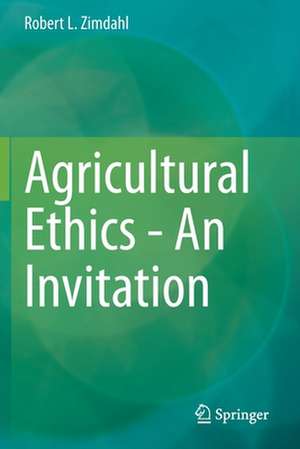Agricultural Ethics - An Invitation
Autor Robert L. Zimdahlen Limba Engleză Paperback – 15 aug 2021
| Toate formatele și edițiile | Preț | Express |
|---|---|---|
| Paperback (1) | 1102.83 lei 6-8 săpt. | |
| Springer International Publishing – 15 aug 2021 | 1102.83 lei 6-8 săpt. | |
| Hardback (1) | 1108.67 lei 6-8 săpt. | |
| Springer International Publishing – 14 aug 2020 | 1108.67 lei 6-8 săpt. |
Preț: 1102.83 lei
Preț vechi: 1344.91 lei
-18% Nou
Puncte Express: 1654
Preț estimativ în valută:
211.09€ • 229.37$ • 177.43£
211.09€ • 229.37$ • 177.43£
Carte tipărită la comandă
Livrare economică 21 aprilie-05 mai
Preluare comenzi: 021 569.72.76
Specificații
ISBN-13: 9783030489373
ISBN-10: 303048937X
Ilustrații: XI, 173 p. 2 illus., 1 illus. in color.
Dimensiuni: 155 x 235 mm
Greutate: 0.27 kg
Ediția:1st ed. 2020
Editura: Springer International Publishing
Colecția Springer
Locul publicării:Cham, Switzerland
ISBN-10: 303048937X
Ilustrații: XI, 173 p. 2 illus., 1 illus. in color.
Dimensiuni: 155 x 235 mm
Greutate: 0.27 kg
Ediția:1st ed. 2020
Editura: Springer International Publishing
Colecția Springer
Locul publicării:Cham, Switzerland
Cuprins
1. Introduction.- 2. From Weed Control To Ethics.- 3. Agriculture- A Brief History.- 4. World Population - Three Views.- 5. Agricultures Moral Dilemmas.- 6. Ethics in Agriculture and Other Disciplines.- 7. Seeking Common Ground.- 8. Ethical Puzzles.
Notă biografică
Dr. Zimdahl obtained his Ph.D. in Agronomy from Oregon State University. He joined the faculty at Colorado State University in 1968 and has led a research program in weed management and soil degradation of herbicides with the production of many graduate students. Dr Zimdahl has always had a keen interest in foreign agriculture and culture and has acted on those interests with Fulbright grants, visiting professorships, and other international programs such as United Nations/FAO committees. He has worked in and visited many countries including Turkey, Italy, Argentina, India, Philippines, Morocco, and Germany.
Textul de pe ultima copertă
I write because I am concerned that I and my agricultural colleagues have avoided addressing the moral dimension of the environmental and social problems we have contributed to. I hope for an exchange of ideas about agriculture's moral dilemmas. I encourage my readers to engage in a collective conversation about the dilemmas and avoid remaining in what Merton calls "the collective arrogance and despair of his own herd." If those engaged in agriculture continue to ignore and fail to realize our common difficulties they will be addressed and resolved by societal pressure and political action, which may not yield the resolution we favor. The book's goal is not to resolve the moral dilemmas raised. It is to raise them and encourage thought and discussion. It will ask but not answer why nearly all involved in agriculture have not addressed the moral concerns voiced by the general public. The agricultural enterprise is committed to the benefits and future success of the present, very productive, chemical, capital, and energy intensive system, which is, in the minds of many, not sustainable. The internal justification invokes the moral claim that they feed the world's population. The question remains whether or not the prevailing moral justification of feeding the world is adequate given all the issues modern, developed country agriculture faces: pesticides in soil, water, and food, cruelty to animals, Biotech/GMO's, corporate agriculture, pollution by animal factory waste, exploitation of and cruelty to migrant labor.
Caracteristici
Engage readers in a collective conversation about environmental and social problems of modern day agriculture Raise moral dilemmas facing the agricultural enterprise Question whether or not the prevailing moral justification of feeding the world is adequate given all the issues modern, developed country agriculture faces
